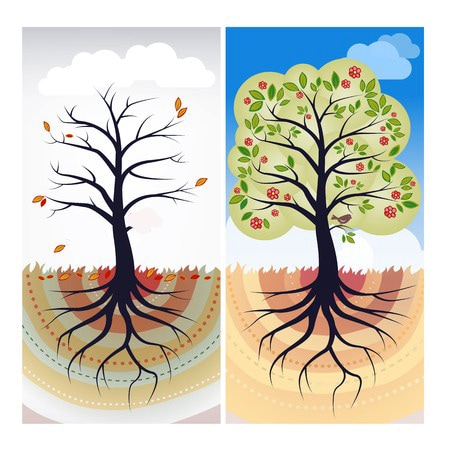
He begins with these words: “This is what the Lord says: “Cursed is the one who trusts in man, who draws strength from mere flesh and whose heart turns away from the Lord” (Jeremiah 17:5). Then, Jeremiah makes his first analogy:
That person will be like a bush in the wastelands;
they will not see prosperity when it comes.
They will dwell in the parched places of the desert,
in a salt land where no one lives (Jeremiah 17:6).
The prophet compares the one who turns away from trusting God to a stunted shrub – not a full grown tree, but a “bush in the wastelands” that can never flourish in its harsh environment. Notice that Jeremiah points to four reasons this “tree” will not grow: it is in infertile soil (“wasteland”), it suffers from a lack of water (“parched places”), it suffers temperature extremes (“of the desert”) and its growth is stunted by salinity (“a salt land”). This picture accurately portrays factors that limit plant growth. We are told in the NIV that this tree will not see “prosperity;” but the Hebrew word tov means “good” of any kind, and most English versions translate it that way.
Jeremiah then makes a contrast with this tree when he says “But blessed is the one who trusts in the Lord, whose confidence is in him” (Jeremiah 17:7):
They will be like a tree planted by the water
that sends out its roots by the stream.
It does not fear when heat comes;
its leaves are always green.
It has no worries in a year of drought
and never fails to bear fruit (Jeremiah 17:8).
This tree, Jeremiah tells us by means of multiple Hebrew idioms, is “planted by the water”(an idiom for nourishment), spreads its “roots” (an idiom for family members or descendants), and does not fear when heat comes (an idiom for persecution or affliction). Its leaves are always green (an idiom for health), it has no worries in “drought” (an idiom for times of need), and it never fails to produce fruit (an idiom for both descendants and also for good success in life). What a difference trust makes!
Jeremiah’s two trees represent simple analogies, but ones based on profound truths. The prophet does not compare righteousness and unrighteousness, good and evil, or make any such broad general comparisons. Instead, he focuses purely on the matter of trust and tells us that the life that does not include trust in God will always be limited and will not flourish or grow. By contrast, Jeremiah says, the one who learns to trust God will survive problems and will flourish and grow abundantly.
But Jeremiah’s two trees also are a symbolic study in spiritual contrast, just like the two trees Genesis tells us grew in the Garden of Eden. The two trees teach us that spiritually, we only grow to the extent that we learn to trust God. It is a simple point, but one worthy of serious thought. As Christians intent on spiritual transformation, we tend to look to spiritual exercises such as prayer and study as our primary means of growth. But Jeremiah reminds us that spiritual growth is not just based on activities such as these, but also on actively and continually increasing our trust and faith in the One who grants growth.
That is a lesson that we see much more fully developed in the New Testament teaching of growing in and through faith, but it is one that Jeremiah makes vividly clear in his simple comparison of the two trees. And we should remember that Jeremiah knew a good deal about faith. He is to be included among the shining examples of faith who suffered “chains and imprisonment” (Hebrews 11:36 and Jeremiah 37:15-16) mentioned in the great “Faith Hall of Fame” chapter of Hebrews 11.
 RSS Feed
RSS Feed
